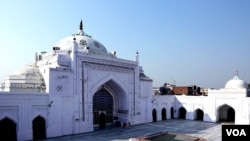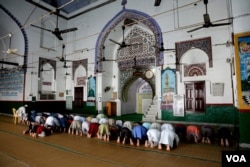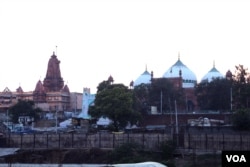A trial court's order that triggered violence this week, leaving six Muslims dead, should be taken to the Uttar Pradesh state's highest court, India's Supreme Court said Friday.
The Supreme Court also asked the trial court not to proceed with the order against Shahi Jama Masjid, a 16th century mosque, until the Allahabad High Court acts on the lawsuit that the mosque will likely file shortly.
A trial court, acting on a petition by some Hindu groups, on November 19 ordered a survey team to inspect the mosque in Sambhal. In the petition, the Hindu groups claimed that the mosque was built in 1526 at the site of a Hindu temple demolished by the Muslim Mughal emperor Babur.
Former Indian Supreme Court Justice Madan Lokur said to VOA in an email that the court order for the inspection of the mosque was "a clear violation of the Places of Worship Act, 1991," referring to a law that froze the status of all religious places of worship as they were on August 15, 1947, the date of India's independence, and prohibits their conversion to any other religion.
"I'm quite shocked that the (Sambhal) court even took 'cognizance of the case' [actively considering the matter]. The damage caused by the court taking cognizance can have a long-term effect," Lokur told the VOA.
"Instead of directing the case to the High Court, the Supreme Court itself should have entertained the appeal against the order anticipating an escalation of cases. There is an urgent need to avoid even the slightest delay, otherwise cases will keep multiplying causing great damage to the polity."
A 'hasty' order?
Muslims have been using the Shahi Jama Masjid Mosque in Sambhal for almost 500 years. In recent years, some right-wing Hindu groups began claiming that Babur, founder of the 16th-century Mughal Empire, destroyed the Harihar Temple and used the rubble to build the mosque. A survey by experts could lead to the discovery of the ruins of the ancient temple, the groups said.
After the Hindu groups filed the petition on November 19, the local court in Sambhal ordered a survey of the functioning mosque's premises.
In an unusually quick response, a team of experts from the Uttar Pradesh state authorities inspected the site of the mosque on the same day, apparently looking for the ruins of any Hindu temple.
When the team returned to the mosque on a second visit on November 24, allegedly not notifying mosque authorities in advance, local Muslims tried to resist them.
Violence erupted as the police tried to disperse the Muslim protesters. At one point the police allegedly opened fire, killing six Muslims and injuring many others.
Supreme Court lawyer Balraj Singh Malik said the judge at the court in Sambhal acted "in a haste" when ordering the survey, leading to the six deaths.
"In the case of such a sensitive matter, the court should have given the respondents a chance to speak before passing an order. The due course of law was not followed, and instead an immediate order was issued," Malik told VOA.
A stubborn problem
For decades, Hindu right-wing groups have claimed that many mosques and Islamic shrines in the country were built after razing "thousands" of Hindu temples during the period of the Muslim rulers. The groups launched a campaign insisting that "one by one" they would reclaim the lands where, according to them, the ancient temples had stood.
A year after the 1991 act protecting places of worship came into force, a Hindu mob pulled down the 16th-century Babri Masjid mosque in the Indian city of Ayodhya, triggering communal violence that killed around 2,000 people across the country. Hindu groups claimed that the mosque stood where the Hindu deity Ram had been born.
In 2019, the Supreme Court awarded the land where Babri Masjid had stood to Hindus and said that in the future the Places of Worship Act would be strictly enforced and no such Hindu claim against any mosque would be entertained by any court.
Yet, over the past few years, right-wing Hindu groups have filed hundreds of petitions with courts across the country seeking control of many mosques and other Islamic structures claiming that they stood on the sites of razed Hindu temples.
Professor and social activist Apoorvanand said that while the deaths in Sambhal are concerning, it is more worrying that Indian courts are "too willing" to initiate processes aimed at turning sacred Islamic sites into disputed structures.
"Across India, courts are admitting petitions claiming that Islamic places of worship were earlier Hindu ones," the Delhi University professor, who goes by only his first name, told VOA in an email.
"The violence at Sambhal also shows that the civil and police administration work as the coercive arms of the Hindutva bodies. They criminalize protests by Muslims and are not shy of firing on them at the first instance," he added.
Former chairman of the Delhi Minorities Commission, Zafarul-Islam Khan told VOA that old monuments like ancient mosques are "easy targets" for Hindu nationalist forces because such sites usually do not have any documents from when they were first built.
"The Hindutva party, too, does not possess any papers or historical evidence. So, they demand a 'survey' of any particular mosque and such surveys are done by people sympathetic towards them, eager to support the Hindutva claim," he said, adding that the Hindu Nationalist groups have prepared a list of 3,000 such mosques, which means that such anti-Muslim cases may continue for years.






